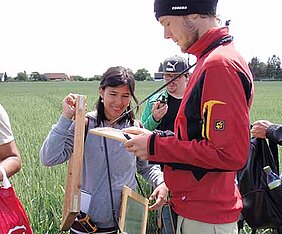Satellite data for agriculture
07/30/2017Important crop information can be gleaned from satellite data. A new project funded by the German Federal Ministry for Economic Affairs is expected to provide further progress in this field.

Securing crop production on our planet in a sustainable way is one of the big challenges of our time, also with regard to climate change. On the one hand, sustainable farming means to guarantee the production of food, textiles and energy in the long run. On the other hand, it involves the protection of natural resources and ecosystems.
Satellite data can be useful in this respect: They deliver information about the growth performance of field crops, for example. This knowledge allows optimizing the use of fertilizer to protect the ground water more efficiently since too much mineral fertilizer can result in excessive nitrate content in our drinking water.
The data from space also allow drought-related crop failures to be assessed at an early stage. This is particularly important for farmers in poorer countries.
Worldwide network of measuring stations
To be able to use satellite data for this purpose, innovative methods are developed in the GLAM.DE research venture headed by Professor Christopher Conrad from the Julius-Maximilians-Universität (JMU) Würzburg in Bavaria, Germany. Moreover, the project aims to incorporate the German expertise in satellite remote sensing in an international network. The Federal Ministry for Economic Affairs and Energy (BMWi) funds the project with around 400,000 euros.
A first milestone has already been reached: The soil assessment and validation site DEMMIN in Mecklenburg-West Pomerania joined the international initiative "Joint Experiment of Crop Assessment and Monitoring" (JECAM) within the scope of GLAM.DE. It is the first German site to be represented in the initiative. DEMMIN is a collaborative large-scale test site operated by the German Aerospace Center (DLR) and the German Research Centre for Geosciences in Potsdam (GFZ).
"Being affiliated to JECAM, we have access to a multitude of other measuring data surveyed at various locations around the planet," Professor Conrad explains. "This provides optimal opportunities to develop new methods to determine plant growth, biomass and soil moisture from satellite data and validate them in different agricultural regions worldwide."
Facts about DEMMIN
The DEMMIN (Durable Environmental Multidisciplinary Monitoring Information Network) soil measurement and validation site is located east of the small town of Demmin in Mecklenburg-West Pomerania. It was kicked off in 1999 as a large-scale test site by the DLR. Since 2011, it has been equipped with further measuring instruments by the GFZ.
Covering more than 30,000 hectares, the site entertains an environmental monitoring network that is unique in Germany. Near-realtime information about climate and soil are collected via a radio network in high time resolution: The environmental sensing network comprises 43 stations. It measures among others air temperature, precipitation, wind and radiation parameters in 15-minute intervals. Additionally, 63 soil moisture gauging stations are installed below the agricultural fields.
"DEMMIN delivers a wealth of data which allows us to continuously improve the monitoring of agricultural areas based on satellite data," says Erik Borg from the DLR; he is the co-initiator of the test site. "Key elements include upholding standards and data quality as well as providing the data e.g. via the TERENO data portal TEODOOR," Daniel Spengler from the GFZ adds.
Websites
JECAM (http://www.jecam.org/)
DEMMIN (http://demminweb.dlr.de/)
Contact
Prof. Dr. Christopher Conrad, GLAM.DE Project Manager, University of Würzburg, Institute for Geography and Geology, Department of Remote Sensing, www.fernerkundung.geographie.uni-wuerzburg.de
Dr. Daniel Spengler, Team Leader JECAM-Germany, research fellow in GLAM.DE, Helmholtz Center Potsdam, German Research Center for Geosciences GFZ, Section 1.4: Remote Sensing, http://www.gfz-potsdam.de/en/section/remote-sensing/
Dr. Erik Borg, Team Leader JECAM-Germany, Senior Scientist DEMMIN, German Aerospace Center (DLR), German Remote Sensing Data Center / National Ground Segment, Neustrelitz







